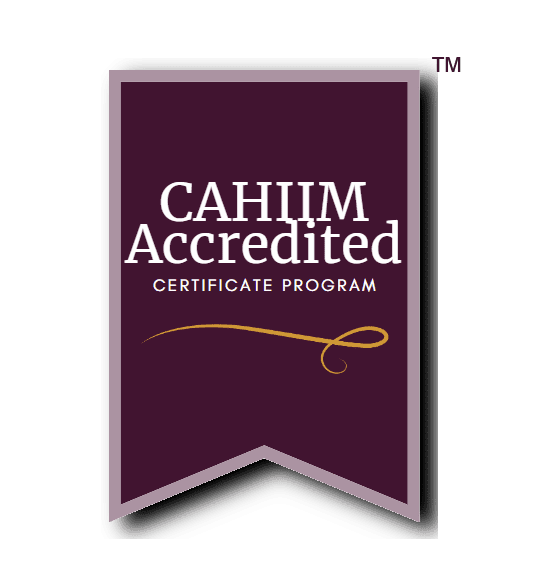Healthcare Management & Informatics Certificate
Looking to upskill and advance your career quickly and efficiently? St. Thomas Aquinas College’s advanced certificate in Healthcare Management & Informatics is designed for working professionals and can be completed entirely online in one year. The program is offered quarterly in 9-week sessions, allowing students to start in September, December, March, or June and maximize their time. All certificate courses stack into our full MBA program if and when you’re ready to continue on your career advancement path, and all remaining MBA courses are offered at a discounted price for our certificate students.
Our Healthcare Management & Informatics program offers a blend of healthcare management, informatics, finance, health information management, and law and ethics coursework. The health informatics field aims to develop methods and technologies for the acquisition, processing, and study of patient data, which comes from various sources and modalities, including electronic health records, diagnostic test results, and medical scans. Graduates will be able to analyze, interpret, and present healthcare data to healthcare organizations, so that it can be used to develop strategic plans and support organizational compliance.

Unique to our program: Students who complete our Advanced Certificate Program/Five Course Completion will receive a CAHIIM Digital Health Leadership Graduate Certificate. You can also be eligible for CHIME Membership and DHL Certification exam.
AT A GLANCE
- 15-credit advanced certificate program
- Fully online
- Complete in as few as 12 months
- Under $10,000
CONTACT
- Dana Caponong | Assistant Director, Graduate Admissions | dcaponon@stac.edu | 845-398-4220
Courses
|
An Introduction to Healthcare Management. The course offers an overview of healthcare system components, services, and management concepts specific to healthcare. The importance of communication and interactions in healthcare management and the management and physical makeup of healthcare organizations. |
This course focuses on the mastery of current technology, legislation, and other key topics in health information management by mapping CAHIIM (Commission on Accreditation for Health Informatics & Health Information Management) standards and curriculum. The course covers electronic health records, patient records, documentation guidelines within the healthcare setting, as well as HIPPA requirements and guidelines.
This course focuses on how microeconomic principles apply to health care delivery and its policies. The course explores the changing nature of healthcare, the social and political sides of issues, and the future of healthcare delivery and finance as the U.S. transitions from quantity healthcare to quality healthcare. The course will also compare and analyze public health policy from an economic perspective.
Learn how health information professionals use data and statistics to understand and improve healthcare delivery in clinical settings. Topics will include basic math and statistics, vital statistics and mortality rates, census and occupancy rates, and other key topics required for CAHIIM competency and certification in health informatics.
This course offers an overview of healthcare business ethics, ethical decision-making, and the impact of social responsibility. The course will prepare students to understand and participate in effective ethical decision-making within healthcare organizations. Through an applied perspective, focusing on the conceptual framework, risks, issues, and dilemmas that will be faced in the real world of business.

Ready to Apply?
Applicants for the Business Advanced Certificates are required to have a bachelor’s degree from an accredited undergraduate institution and a minimum of a 2.8 grade point average, based on a 4.0 scale.
The application process is simple:
- Complete the free Graduate Application
- Submit your Official Transcript(s)
- Submit the contact information for two professional recommenders on your application
- Submit your current resume
For students with an undergraduate degree outside the United States, applicants must have a transcript evaluation completed by a current member of NACES. St. Thomas Aquinas partners with SpanTran to help you select the right evaluation at a discounted rate. Access the application here: SpanTran Application – St. Thomas Aquinas College. TOEFL Scores may be required for some international applicants.
